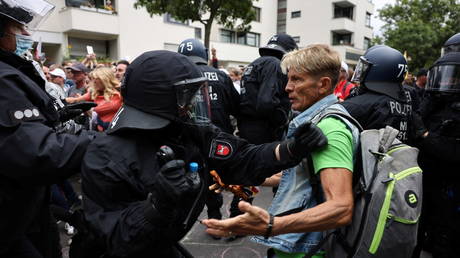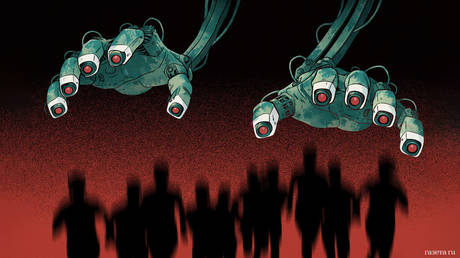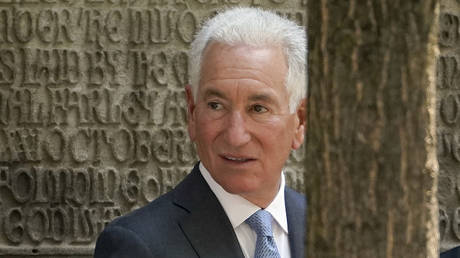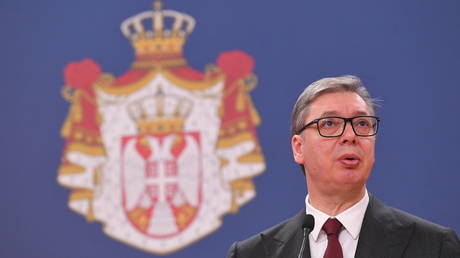
In spite of video evidence online, police in Berlin, Germany, have rejected the criticism by the United Nation’s special rapporteur on torture of their heavy-handed response to anti-lockdown rallies that saw hundreds arrested.
The protesters recently gathered in unauthorized demonstrations against the government’s Covid-19 measures, in contravention of the restrictions on such gatherings under the Infection Protection Act. They heeded no warnings and attacked officers, the Berlin police said in a statement on Monday, warranting their “violent” enforcement measures.
The statement was issued in response to the views expressed in the media last week by Nils Melzer, the UN special rapporteur on torture. Melzer had said he would be requesting an official statement from the government on police actions during the massive anti-lockdown and anti-vaccination rally in early August.
“There have been some videos that are worrying,” Melzer told the DPA news agency. “The evidence is strong enough [to suspect]that human rights violations may have been committed.”
He requested some additional information about one video that surfaced on social media showing a police officer brutally grabbing an elderly woman by the neck and throwing her to the ground. “She could have died,” Melzer said.
However, the Berlin police apparently believed there was nothing extraordinary about the footage that drew the attention of the UN official, and have stated that “violence” was virtually a part of their mandate.
“Direct enforcement is violence. Violence harms. Violence hurts. Violence looks violent,” a Berlin police spokesperson, Thilo Cablitz, told DPA on Sunday. “Direct enforcement is still a part of our legal system, even with all those images,” he added, referring to the videos of police brutality that were shared on social networks and via various media outlets.
The police also addressed the specific case involving the elderly woman that had sparked Melzer’s concern. Claiming the officer who threw the woman to the ground acted professionally, the spokesperson said he had held her by the back right until she hit the ground “to avoid head injuries,” according to a statement quoted by the Tagesspiegel daily.
Cablitz admitted that the police were investigating cases of suspected bodily harm during the demonstrations on August 1, however.
‘Communication issue?’
According to Melzer, there was no reason for the violence in the first place. The rapporteur believes the police failed to make their demands clear in the first place. “This is a communication problem, not a violence problem. An armored police force might not be the right answer,” he told DPA.
However, Cablitz maintained that it would have been impossible to communicate with many of the protesters. “I can very well remember the number of people who could have been reached out to … there were three,” he said, adding that he had been among the officers deployed to police the rallies.
He said the protesters repeatedly ignored the police demands and attacked officers. More than 60 police officers personnel had been injured in the rallies, he added.
The Berlin police union was more receptive toward Melzer’s criticism. “When the UN torture commissioner receives such complaints, it is his duty to investigate and look at things impartially, without prejudice, and with all due care,” the union’s spokesperson, Benjamin Jendro, told the German media.
Jendro nonetheless expressed his concern that the UN official’s position in this case could be “instrumentalized” by the anti-lockdown and anti-vaccination movements as well as conspiracy theorists seeking to discredit the police. “It is no secret that one tries to legitimize one’s own statements through respected personalities,” he added.
However, some German lawmakers appeared to be more concerned with the actions of the police rather than the potential gains of “conspiracy theorists.” “Police violence should always be subject to evaluation, regardless of whom it is directed against,” said Ulla Jelpke, an interior policy spokeswoman of the Left party’s faction in the Bundestag.
The anti-lockdown protest in Berlin on August 1 became chaotic when police tried to forcefully disperse the crowds. Some 5,000 people took part and around 600 were arrested.
Footage shared on the internet showed many instances of police violence, including officers kicking and shoving protesters, punching their faces, pepper-spraying them, and grabbing them and throwing them to the ground.
Think your friends would be interested? Share this story!




